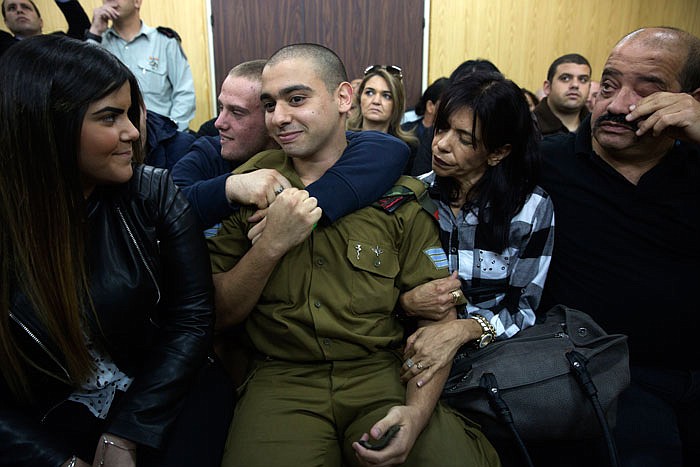TEL AVIV, Israel (AP) - The rare manslaughter conviction Wednesday of an Israeli soldier who fatally shot a badly wounded Palestinian attacker exposed a deepening rift between proponents of the rule of law and a burgeoning nationalist movement.
The military court verdict against Sgt. Elor Azaria marked a victory for commanders seeking to preserve a code of ethics, but it also brought calls for a pardon from prominent hard-line politicians, led by Prime Minister Benjamin Netanyahu, who expressed sympathy for the soldier or depicted him as the victim of a detached elite.
In a statement on Facebook, Netanyahu urged the public to "act responsibly" toward the military, Israel's most respected institution.
"We have one army that is the basis for our existence. IDF soldiers are our sons and daughters, and they must remain above all disputes," he said. But making no direct mention of the military court, he said: "I support granting a pardon to Elor Azaria."
With the statement, Netanyahu plunged into a visceral dispute that has deeply divided Israel, where military service is compulsory and support for young soldiers is widespread.
Since the March shooting, the military leadership has come under unprecedented criticism, as members of Netanyahu's coalition accused top generals of abandoning a serviceman on the battlefield. The uproar helped fuel the resignation of Defense Minister Moshe Yaalon, who staunchly defended the army from the assault from within.
It is rare for a military court to rule against a soldier over lethal action taken in the field, not only in Israel but also elsewhere in the world. But for a country that claims to have the "most moral army in the world," it had no choice but to come down hard on a soldier that the top brass was convinced had strayed, said Amichai Cohen, a senior fellow at the nonpartisan Israeli Democracy Institute think tank.
"If you want the justice system to be taken seriously, you have to punish something like this," he said. "The court can't be influenced by the changing political climate."
Azaria, an army medic, was caught on video by a human rights worker fatally shooting Abdel Fattah al-Sharif, a wounded Palestinian attacker who had stabbed a soldier in the West Bank city of Hebron. Al-Sharif was on the ground, unarmed and virtually motionless, when Azaria fired a single bullet in his head as other soldiers milled about.
The head of the three-judge panel, Col. Maya Heller, broke down Azaria's defense arguments in painstaking detail in delivering the verdict over nearly three hours.
She said there was no evidence to support his conflicting claims that the attacker was either already dead or had posed a threat. She called Azaria's testimony "unreliable," said he could not have "both sides of the stick," and concluded the shooting was "needless."
"We found there was no room to accept his arguments," she said. "His motive for shooting was that he felt the terrorist deserved to die."
That made little difference to Azaria's many supporters.
Outside military headquarters in Tel Aviv, hundreds of his backers held large Israeli flags, banners supporting Donald Trump and others that said "the nation neglected a soldier on the battlefield."
They periodically scuffled with police, and some chanted veiled death threats against the Israeli military chief, Lt. Gen. Gadi Eizenkot. The Ynet news site said the judges and prosecutor would receive bodyguards. The army declined to comment.
Netanyahu's evening announcement came hours after other members of his coalition called for Azaria to be pardoned immediately.

